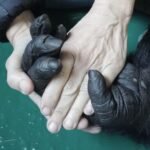Early living conditions greatly affect their social capacities
A recent study published in the scientific journal PLoS ONE, based on data collected over 12 years on former pet and entertainment chimpanzees housed at Fundació MONA, highlights that early trauma affects chimpanzees’ grooming competencies throughout their life.
- Grooming is a key social behaviour in primates, which plays a significant role in bonding and reconciliation after conflicts.
- Chimpanzees that have been poached from their natural habitat, most likely witnessing the killing of their mother and/or group members, and transported under deplorable conditions to Europe, showed to be far less active groomers compared to captive born chimpanzees.
- Similarly, chimpanzees that have been predominantly housed without access to conspecifics during the first 5 years of their life are less active when it comes to grooming, compared to those that used to live with other chimpanzees.
- Traumatic life experiences and unfavourable living conditions in their infancy produce long lasting social limitations, impacting their social behaviours, regardless of the current living conditions .
- The results of this study suggest that, similar to humans, chimpanzees experience a very sensitive social and emotional development phase during infancy, and traumatic experiences in that time can have a lasting impact on their future behaviour and quality of life.
Background
Due to deforestation, increasing human activities in their natural habitat, and the threat of poaching, all great ape species ―chimpanzees, bonobos, gorillas and orangutans― are either classified as endangered or critically endangered species by the International Union for Conservation of Nature. Since the 1950s thousands of chimpanzees have been taken from the wild in order to be shipped to USA, Asia, and Europe. Others were obtained through captive breeding, but all with the intention to be used for biomedical research, the entertainment industry, or to be held as pets.
Sadly, due to the legal situations and missing funding, most of these chimpanzees never escaped this destiny and only a very small percentage could be confiscated to be rehabilitated and introduced into social groups at primate rescue centres.
While there is nothing that can be done about their past, after having suffered for the gain and entertainment of humans, we now have the obligation to care for and offer the best living conditions possible for these animals. Being able to do so, depends greatly on our capacity to understand what these animals experienced and how they were affected by their past.
What is the other side of their use and abuse as former pets and entertainment chimpanzees?
While there are some studies focusing on the effects of laboratory housing on non-human primates, very little is known in this regard.
A Spanish-Austrian research team funded by the ” la Caixa Foundation”, including researchers from the Fundació MONA, the University of Girona and the Univerity of Graz, are working with former pet and entertainment chimpanzees to gain a better understanding on how and to what degree these animals are affected by their past and current living conditions.
Dietmar Crailsheim, PHD student at the Girona University and researcher at Fundació MONA states: “Although it is of utmost importance to advance in the field of conservation and to raise awareness in order to ensure that less animals have to suffer similar destinies as those former pet and entertainment chimpanzees we currently work with, we should not forget about the animals that are, or until recently were, still trapped in these abusive and damaging situations. Part of our responsibility is to fully understand their limitations, needs, and capacities in order to be able to provide them with an adequate environment and allowing them to live a life worth living.”
“Moreover, we could show that the housing conditions during infancy affect social grooming as well, as we found chimpanzees who were mainly housed in solitary confinements spent less time grooming compared to chimpanzees who were mainly socially housed during their first five years of life”, says last author Elfriede Kalcher-Sommersguter of the University of Graz.
What is the “scar” left in these animals?
In the words of Dr. Miquel Llorente ― research supervisor and Research Manager of Fundació Mona― : “Despite the years that have elapsed since they arrived at MONA, the emotional scar remains present in these subjects. They are socially impaired for life. Nevertheless, the new life of these individuals in social groups, where they can develop new social skills, in large naturalized and complex enclosures, as well as a correct cognitive and emotional stimulation, may improve their quality of life. It is our moral responsibility.” “These results,” emphasizes Dr. Llorente, “highlight the importance of investigating these abused animals to improve the well-being and management practices of chimpanzees with traumatic backgrounds, as well as guaranteeing the economic viability of recovery centres that work day-to-day for the welfare and conservation of primates. ”
The results mentioned here have been published in the journal PLOS ONE:
Crailsheim, H.P. Stüger, E. Kalcher-Sommersguter & M. Llorente (2020). Early life experience and alterations of group composition shape the social grooming networks of former pet and entertainment chimpanzees (Pan troglodytes). PLOS ONE. DOI: 10.1371/journal.pone.0226947


